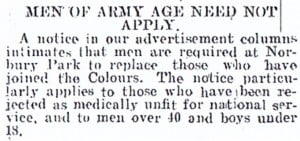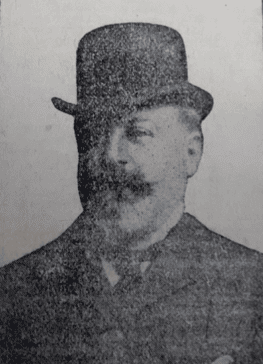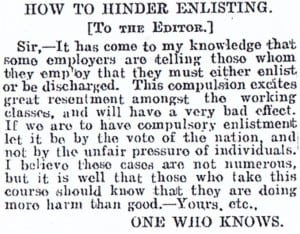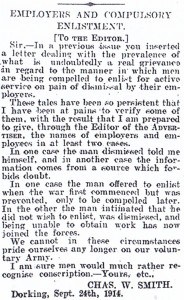
In August 1914 Henry Cubitt announced in the Surrey Advertiser that in order to encourage enlistment he and ‘the principal people’ of Dorking district were signing a pledge that at the end of the war they would give preference in employment to those who had served. Large landowners owned many farms and businesses, as well as employing scores in their mansions and gardens. Fear of being denied future employment was persuasive. Cubitt quoted one local landowner’s success in sending his employees forward: ‘I think you will be glad to hear that I have no longer a single man between 19 and 30 years old on my place, if all pass the doctor ten fine lads are joining Kitchener’s Army from house, garage, garden and farm’

© Dorking Advertiser
Leopold Salomons of Norbury Park offered every unmarried man in his employment half pay whilst he was away. Married men would receive full pay with half going to their wives. When personally canvassed, 14 of his staff enlisted. When Salomons came to replace those leaving the local paper carried a notice that men of army age need not apply – unless they were unfit for service

© Dorking Advertiser
In a letter to the Dorking & Leatherhead Advertiser one man alleged that other employers were sacking men if they did not join up, whereupon they had no choice but to enlist. Kitchener’s Army was not a volunteer army, he contended, but unrecognised conscription of employees by their employers. Such tactics by the well-to-do, claimed another correspondent, were causing resentment amongst working people. If ‘compulsory enlistment’ was to be imposed, he said, it ought to be by vote of the nation, not by individuals with the power to exert unfair pressure.

© Dorking Advertiser
Last : Recruiting at the Market
Next : Religion and Recruitment

